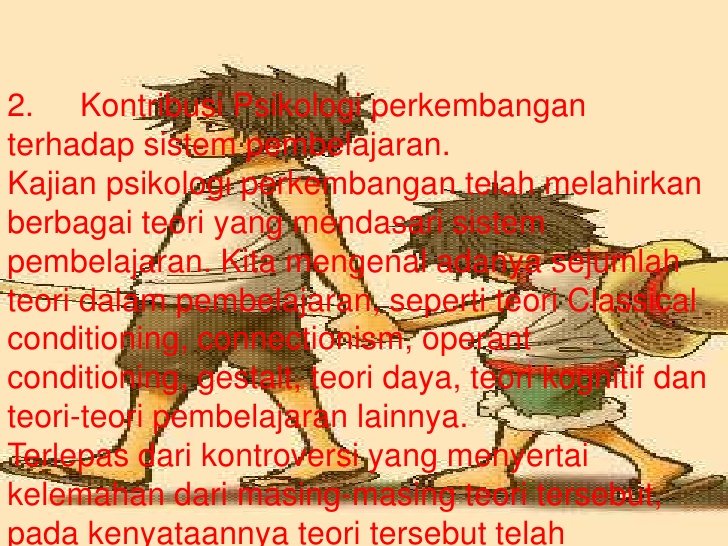Contribution of Educational Psychology to Curriculum Development.

source
The study of educational psychology in relation to the development of educational curriculum is mainly concerned with understanding the aspects of behavior in the context of teaching and learning. Apart from the various streams of psychology that color education, in essence this psychological study gives attention to how in put, process and out education can walk with not ignore aspects of behavior and personality of learners.
Psychologically, humans are unique individuals. Thus, psychological studies in the development of curriculum should consider the uniqueness of each individual, both in terms of intelligence levels, abilities, attitudes, motivations, perasaaan and other individual characteristics characteristics.
Educational curriculum should be able to provide opportunities for each individual to be able to develop in accordance with the potential he has, both in terms of subject matter and delivery methods.
In particular, in the current context of education in Indonesia, the curriculum developed today is a competency-based curriculum, which essentially emphasizes the development of basic knowledge, skills, and values reflected in thinking and action habits. The habit of thinking and acting consistently and continuously enables a person to be competent, in the sense of having the knowledge, skills, and basic values to do something.
Thus in the development of competency-based curriculum, psychological studies mainly deal with the following aspects: (1) students' ability to do things in different contexts; (2) student learning experience; (3) learning outcomes (learning outcomes), and (4) standardization of students' abilities
- Contribution of Educational Psychology to Learning System
The study of educational psychology has spawned a variety of theories that underlie the learning system. We recognize a number of theories in learning, such as: theories of classical conditioning, connectionism, operant conditioning, gestalt, power theory, cognitive theory and other learning theories. Regardless of the controversy that accompanies the weaknesses of each of these theories, in fact these theories have contributed significantly in the learning process.
In addition, the study of educational psychology has also generated a number of principles that underlie the learning activities of Nasution (Daeng Sudirwo, 2002) explores thirteen principles in learning, namely:
In order for a person to learn, he must have a purpose
2.The purpose must arise from or relate to the needs of his life and not because forced by others.
3.The person must be willing to experience various difficulties and endeavor diligently to achieve a goal that is valuable to him.Learn it must be proven from the change of behavior.
In addition to the main objectives to be achieved, also obtained odd results.
Learn more by doing or doing.
Someone learns as a whole, not only the intellectual aspect but also the emotional, social, ethical and so on.
Someone needs help and guidance from others.
8.To learn required insight. What is learned must be fully understood. Learning is not just memorizing facts off verbally.
9.In addition to pursuing real learning goals, one often pursues other goals.
10Learn more successfully, if the business provides a pleasant success.Thoughts and exercises need to be but must be preceded by understanding.
12.Learning is possible only if there is willingness and desire to learn.Contribution of Educational Psychology to Assessment System
Educational evaluation is one of the most important aspects of education to understand the extent of educational success. Through psychological studies we can understand the development of what behaviors obtained by learners after attending certain educational or learning activities.
In addition, psychological studies have contributed significantly to the measurement of the potential of each learner, especially after the development of various psychological tests, both to measure the level of intelligence, talent and personal personality lain.Kita know a number of psychological tests that are still widely used to measure the potential of an individual, such as Multiple Aptitude Test (MAT), Differential Aptitude Tests (DAT), EPPS and other measuring instruments.
Understanding of intelligence, talents, interests and other aspects of personality through psychological measurement, has significance for the development of individual education process concerned so that in turn can be achieved optimal individual development.

Peace, Abundance, and Liberty Network (PALnet) Discord Channel. It's a completely public and open space to all members of the Steemit community who voluntarily choose to be there.Congratulations! This post has been upvoted from the communal account, @minnowsupport, by dan66 from the Minnow Support Project. It's a witness project run by aggroed, ausbitbank, teamsteem, theprophet0, someguy123, neoxian, followbtcnews, and netuoso. The goal is to help Steemit grow by supporting Minnows. Please find us at the
If you would like to delegate to the Minnow Support Project you can do so by clicking on the following links: 50SP, 100SP, 250SP, 500SP, 1000SP, 5000SP.
Be sure to leave at least 50SP undelegated on your account.